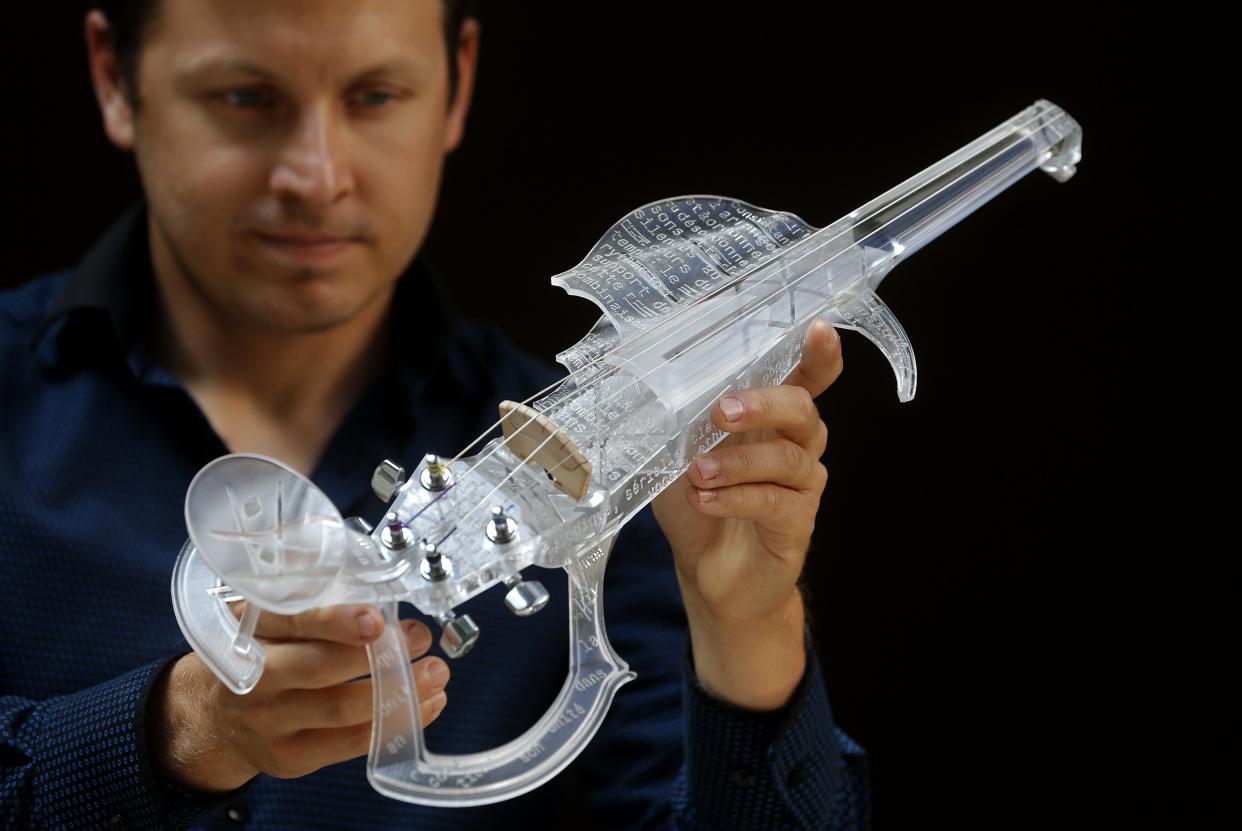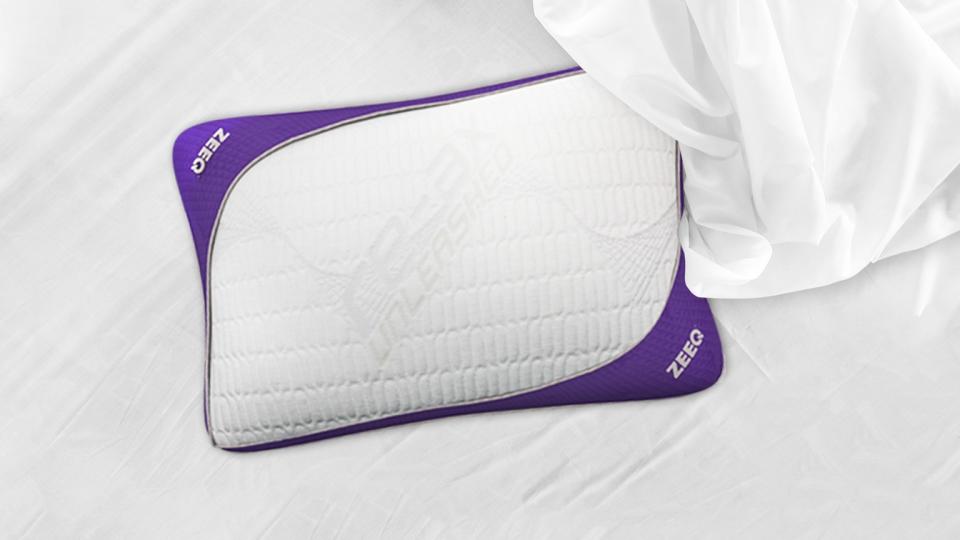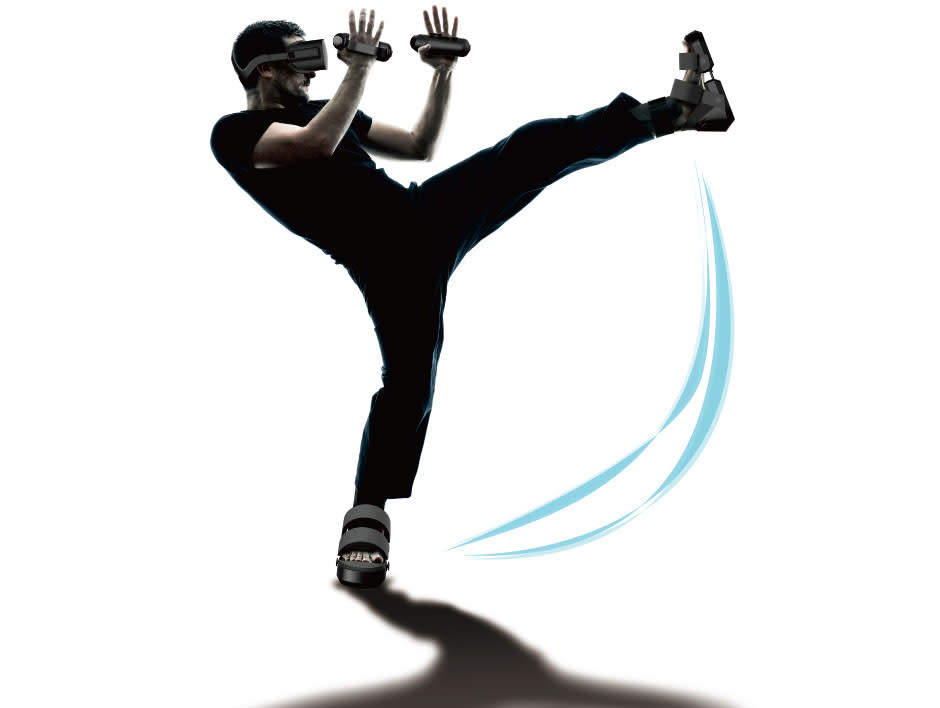The weirdest tech we saw at CES 2017

LAS VEGAS—“Just because you can do something doesn’t mean you should” is not a motto anybody cares to live by at CES, the huge consumer tech show in Las Vegas. Every year, the show floor collects a cornucopia of gadgets that attempt to meet one human need or another in ways you wouldn’t imagine—or, sometimes, want.
Zeeq Smart Pillow
This $249 connected pillow hides eight speakers and an array of sensors to monitor your sleep movements. So it can lull you to sleep with the soundtrack of your choice; if it later detects you snoring, it will gently vibrate to coax you to change your sleeping position. Like many of the gadgets at CES, it also connects to Amazon’s (AMZN) Alexa, allowing you to ask the virtual assistant how you slept last night. It’s unclear if consistently poor sleep will lead to Amazon suggesting stuffed-animal purchases.
Cerevo’s Taclim
This virtual-reality project has you strap on chunky black sandals that can simulate walking on such surfaces as gravel, concrete, a puddle, or snow by generating different vibrations against your soles. Cerevo’s VR footwear, which may cost anywhere from $1,000 to $1,500 when they ship this fall, also record the movement of your feet—you march in place to walk through a scene and can kick to defeat robot adversaries. My brief test of that last feature went awry when I managed to kick one sandal off.
Kérastase Hair Coach

This smart hairbrush from L’Oreal and Withings, due in the middle of this year for a price somewhere under $200, uses four sensors and a microphone to gauge your brushing and check for signs of damaged hair—apparently, split ends make a distinct sound when brushed. A companion app will suggest better brushing techniques and what hair-care products you should buy. But it won’t be able to count how many gray hairs CES has put on my head.
Gamified toothbrushes
I found not one but two companies trying to get children to brush their teeth by making it part of a video game. The Grush toothbrush, due in March for $59, has youngsters scrubbing monsters off a depiction of their teeth; it won Intel’s (INTC) “America’s Greatest Makers” competition last year. The $29.99 Playbrush, meanwhile, is a pod where you stick an analog toothbrush (so you don’t have to confiscate your kid’s coveted “Frozen”-themed toothbrush), and it works in the same basic way.
Boozy bands
I also found two different exhibitors in the Eureka Park startup exhibits in the basement of the Sands convention center working on the same basic idea: a wristband that detects the alcohol that diffuses from your skin as you drink. Both the Proof and Quantac bands will report your level of tipsiness to a smartphone app that you can discreetly check. Proof’s effort is farther along, but its app still lacks the essential feature of disabling your access to social media after you get sufficiently soused.
3Dvarius
This 3D-printed electric violin, mostly clear plastic, is based on a model of a Stradivarius but sounds more like an electric guitar than one of those classic stringed instruments. At €5,833 and up, it’s expensive but nowhere near a Strad’s price range. It’s unquestionably the most interesting violin I’ve seen since the Electric Slugger, the converted baseball bat that the National Symphony Orchestra’s Glenn Donnellan occasionally uses to play the national anthem at Washington Nationals home games.
Uzer’s Eugene
Are you ready for quantified garbage? This small scanner is designed to be positioned just above a trash can; when you scan the barcode on an item you’re throwing out, it will advise you of its recycling potential and record the disposal so you can track what you use, know when to reorder it, and possibly have your frequent purchases rewarded with points from stores. It’s due to sell for $99 at the end of the year.
Drone hunting
I know from your comments that many of you long to shoot down the first stranger’s drone to buzz your backyard. Skyrocket Toys decided to have some fun with that notion by inviting visitors to its exhibit to try to knock down its $50 Sky Viper drone by shooting plastic balls out of an air cannon. They were more accurate with their shots than I expected.
Hyundai Health + Mobility Cockpit
The Korean car manufacturer’s experiment would have the car checking your physical state with various biometric data so it can adjust your environment appropriately. For example, it could play appropriate music—acoustic folk might encourage you to drive slowly in a neighborhood—and fill the cabin with such scents as a calming lavender.
More of our CES coverage:
Samsung unveils gaming laptops and a partnership with Google
Carnival is turning its ships into floating connected hotels
Email Rob at rob@robpegoraro.com; follow him on Twitter at @robpegoraro.







